The Hunger Games
 I enjoyed this a lot more than I expected, though I don't know why I didn't expect to like it. I mean, I do love dystopian novels set in the future, and some of the most interesting of this genre are aimed at the "young adult" audience. (One of my favorites is The Dying Sun, btw.) So, this story was right up my alley.
I enjoyed this a lot more than I expected, though I don't know why I didn't expect to like it. I mean, I do love dystopian novels set in the future, and some of the most interesting of this genre are aimed at the "young adult" audience. (One of my favorites is The Dying Sun, btw.) So, this story was right up my alley.The main character, Catniss, is everything that a good leading lady should be: strong, funny, capable, smart, and just awkward enough to keep her from being too perfect.
The premise is also interesting: the United States, in the future, is divided into districts instead of states, after a war of rebellion. As a penance for the rebellion, each year the districts have to send children to the Hunger Games, a sort of reality TV show in which the "survivor" is actually the only survivor, having killed off all of other opponents. (This makes the actual TV show "Survivor" even more hilariously silly than it already is.)
The action is believable, the characters are flawed and interesting, the scenario is nail-biting, even though you pretty much know how it will end.
I really liked this book, and though I haven't read the rest of the trilogy, I plan to eventually, though I'm not sure where the story can go from here. It's a brilliant addition to the Young Adult Dystopian Future genre.
A Year in the Life of William Shakespeare: 1599
 This book started off strong, but dragged a bit in the middle. The author is clearly very good at this subject: the world of William Shakespeare in the year 1599. The book is broken up into sections: spring, summer, fall, and winter.
This book started off strong, but dragged a bit in the middle. The author is clearly very good at this subject: the world of William Shakespeare in the year 1599. The book is broken up into sections: spring, summer, fall, and winter. The spring was interesting because of the legal difficulties of Mr Shakespeare and his fellow players, as they moved their theater to a new location, without their landlord's approval.
The summer got a little slow because of the war in Ireland. The war was apparently very important for Elizabethan England in 1599, culturally and politically. The author went to some great lengths to describe the war and its political implications for Queen Elizabeth, her court, and for entertainers such as Shakespeare. I found this section to be pretty dull, however, because it was so long.
The book picked back up in the last section, though. I really enjoyed the view into Shakespeare's writing process, which we can infer based on the revisions and editions of Hamlet that appeared during Shakespeare's lifetime. Learning about the literary influences that went into all of the plays and sonnets was a highlight of this book.
I did learn a lot about Elizabethan England, but I was really hoping for a more day-to-day view of life in Shakespeare's time, rather than the political machinations of Queen Elizabeth's court.
The American Way of Death Revisited
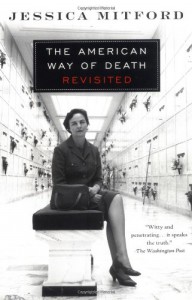 I only gave this three stars, even though I thought the book was great. I reduced the star value because, though the book has a fantastic subject and the writing is wonderful, the information is necessarily dated. (This is the revised edition, which was published in the 1990s.)
I only gave this three stars, even though I thought the book was great. I reduced the star value because, though the book has a fantastic subject and the writing is wonderful, the information is necessarily dated. (This is the revised edition, which was published in the 1990s.)That said, however, the book certainly is food for thought. The author digs into the funeral profession, why it costs so much to die, and how to die without leaving your descendents with a load of debt from the funeral.
Luckily there are more updated volumes about this topic, and I'd recommend reading those, but this is what started it all.
The Spirit Catches You and You Fall Down: A Hmong Child, Her American Doctors, and the Collision of Two Cultures
 Wow, I had heard good things about this book, but I didn't expect to be so moved by this alternately fascinating and frustrating story. The author does a fantastic job of telling the story from both points of view: the American doctors' and the Hmong family's. She manages to present both groups sympathetically, which must have been a huge challenge considering the story of Lia, the Hmong child at the center of it all.
Wow, I had heard good things about this book, but I didn't expect to be so moved by this alternately fascinating and frustrating story. The author does a fantastic job of telling the story from both points of view: the American doctors' and the Hmong family's. She manages to present both groups sympathetically, which must have been a huge challenge considering the story of Lia, the Hmong child at the center of it all. I think this should be required reading of any anthropologist considering writing ethnography. The author is not an anthropologist, but she walks the line of ethnography with grace and kindness.
The final chapter is just stunning in its sadness and its descriptive narrative of a Hmong healing ceremony.
Definitely recommended.
Devil Bones
 Eh, not the best Bones book. I guess everyone has to do a Voodoo/Santeria themed book. I do like Brennan, though, as always.
Eh, not the best Bones book. I guess everyone has to do a Voodoo/Santeria themed book. I do like Brennan, though, as always.
All the King's Men
 I actually liked this book a lot more than I expected. The opening chapter kind of put me off, but I pushed through, and I'm glad I did. The opening is a sort of Kerouac-ish, romanticized, stream-of-consciousness-ish, description of a road trip.
I actually liked this book a lot more than I expected. The opening chapter kind of put me off, but I pushed through, and I'm glad I did. The opening is a sort of Kerouac-ish, romanticized, stream-of-consciousness-ish, description of a road trip.But once I was past that, the story really picked up. I started reading this while working in a theater that was doing the stage version. I'm glad I read the book to fill out the story.
The story of Willie Stark is, of course, the thinly disguised fictional version of Huey Long, the Louisiana politician who became governor and was assassinated in the state capitol. So the book is usually described as the story of Stark, a country boy who wanted to do good, but was corrupted by power, and who eventually was trapped by his own success.
The narrator in the book is Jack Burden, a journalist who eventually comes to work for Willie Stark. I thought Jack's story was the more interesting one here: he's a guy who kind of drifts along, doing whatever comes in front of him. Throughout the book, Jack tries to find meaning/connection in the random events of life. It's only after the death of someone important in his life, and the effects of that death, that Jack starts to find meaning and connection with other people.
I enjoyed it, partly for its setting in (fictional) Louisiana, and also for its own sake.
Still Life: A Chief Inspector Gamache Novel
 I wanted to like this more than I did. I didn't *dislike* this, but it was kind of lackluster. I wanted to read it because it's set in Quebec, and after enjoying that part of the Temperance Brennan series, I saw this at the library and grabbed it. I think the series will get better, because the setting is great: the combination of cultural artifacts and languages in Quebec makes for interesting reading.
I wanted to like this more than I did. I didn't *dislike* this, but it was kind of lackluster. I wanted to read it because it's set in Quebec, and after enjoying that part of the Temperance Brennan series, I saw this at the library and grabbed it. I think the series will get better, because the setting is great: the combination of cultural artifacts and languages in Quebec makes for interesting reading. The story here was interesting, but not super compelling. And the characters of the small town in which the crime occurs were also interesting, but not highly compelling either.
I'll keep an open mind and try another one in the series before I give up.
East of Eden
 I began this with some trepidation, considering its length. I made it through, but I doubt I'll read it again.
I began this with some trepidation, considering its length. I made it through, but I doubt I'll read it again.I was prevented from sinking deep into the story, though, which is why I am hesitant to say I really liked the book. I think I was prevented from being entirely drawn into Steinbeck's world of Salinas because of Steinbeck's writing. I found the writing in this book to be astoundingly beautiful; the descriptions of the characters and the locations were detailed to the point that I could nearly see the characters in front of me. And the landscapes of the farming areas of Salinas were likewise done with such a fine touch that I could imagine myself there.
And therein was part of my problem, I think. The entire time I was reading the book, I was aware that Steinbeck was consciously and deliberately trying to write the Great American Novel. I could only read this book as a period piece, a product of its time. The characters, while beautifully drawn in their detail, were simply pawns in his larger project. I won't say that the characters were entirely cardboard, but even the characters that are drawn in the most detail--Adam and Cathy, for example--still seem weak to me.
Of course, you can't miss the biblical parallels, which I thought were a bit overdrawn. I mean, if you're writing the Great American Novel, you have to really go for your metaphors, so I guess the Cal/Cain, Aron/Abel, Adam, and Cathy/Eve parallels have to be overdone. But I have to say that the biblical precedents for all these characters are pretty thin too, so I guess Steinbeck was doing the best he could with the material he was given.
I guess in a nutshell, I came away with a sort of disinterested fascination with Steinbeck's impressive mastery of language and writing, but not really moved by the story. It was as though the characters were acting out their story at the end of the kaleidoscope of Steinbeck's beautiful writing, so most of their motives were obscured, which distanced me from the characters, and thus from the story and its metaphors.
Recommended with reservations: for those who want to read a period piece, or who want to see a master writer at the top of his game.
The Graveyard Book
 For a book that starts with an ugly triple murder, this book is remarkably sweet and touching. I really enjoyed Bod, the main character, and his guardian Silas. But all of the ghost characters are wonderful.
For a book that starts with an ugly triple murder, this book is remarkably sweet and touching. I really enjoyed Bod, the main character, and his guardian Silas. But all of the ghost characters are wonderful. It's a brilliant coming-of-age story.
On the Map: A Mind-Expanding Exploration of the Way the World Looks
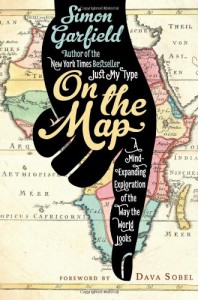 This book was actually great! I really enjoyed it a lot, though I wasn't expecting to, necessarily.
This book was actually great! I really enjoyed it a lot, though I wasn't expecting to, necessarily.I had expected a sort of chronological survey of human use of maps, and the book does take a loose chronological approach, but it's so much more than that.
Each chapter is about a different type of map, or a different use of maps that humans have found. The chapter on Google mapping was especially interesting. This author takes a pretty dim view of our reliance on GPS and phone maps, though. He's squarely old-school when it comes to affinity for paper maps.
I learned a lot about mapping through human history. He gives a bit of time to non-European mapping in the early chapters, but the book really focuses on European and North American mapping and geographers. I was a bit disappointed that I didn't really learn more about Asian mapping history.
Another fun chapter was the exploration of maps in popular fiction/movies/tv shows. Harry Potter's Marauder's Map made an appearance, as did Tolkien's map of Middle Earth. He also explored the embedded maps in video games such as Grand Theft Auto and Myst, which I really enjoyed.
Recommended!!
The Yiddish Policemen's Union
 I really enjoyed this! I didn't expect it to be such a wild ride, but it was hilarious and oddly touching.
I really enjoyed this! I didn't expect it to be such a wild ride, but it was hilarious and oddly touching.
Refuge: An Unnatural History of Family and Place
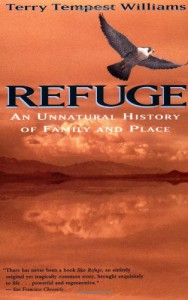 I wanted to like this book, but in the end, I thought that it was basically Annie Dillard-style writing, but not nearly as polished and seamless as Dillard's work.
I wanted to like this book, but in the end, I thought that it was basically Annie Dillard-style writing, but not nearly as polished and seamless as Dillard's work.This book tries to weave birdwatching into the process of the author's mother's death from (I believe) cancer. So it had the potential to be beautiful and heartbreaking. But it never did really become either beautiful or heartbreaking.
The alternation between scenes of birdwatching and mother's illness was kind of jarring, and broke up the emotional content of both topics.
I wish I had liked it more.
Will You Miss Me When I'm Gone?: The Carter Family and Their Legacy in American Music
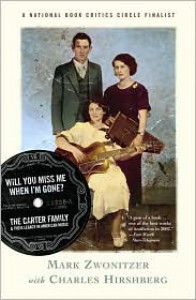 I really enjoyed this biography of the Carter family. I expected to enjoy it, as I've heard good things about it, and I love the music of the Carters. But I really zipped through the book because it was very easy to read, and well-written.
I really enjoyed this biography of the Carter family. I expected to enjoy it, as I've heard good things about it, and I love the music of the Carters. But I really zipped through the book because it was very easy to read, and well-written.The story of the Carter family is really the story of the recording industry and the story of country music in the US, all rolled up into one biography. This book focused mostly on the inner family story of the three Carters and their relations, rather than intentionally bringing out the history of recorded music or the history of country music. I think that would have interrupted the flow of the story, and made for a less pleasurable reading experience, though the information might have been nice.
The story of the Carter family is a fascinating one, full of human drama, joy, sorrow, bitterness, and everything else that humans generate for themselves. I knew most of the story of the original Carter family (Maybelle, Sara, and A.P.), but I enjoyed getting to know the part of the story in the 1950s through the 1980s, when Maybelle's daughters, the Carter sisters, were at the height of their careers. The Hank Williams and Johnny Cash years are described here with the same compassion that the rest of the story gets, a mostly sympathetic narrative. Maybelle is especially developed here, as she was the most visible member of the original Carter family, since she continued performing long after the other two retired.
They had their share of fun times, but the overwhelming sense of the story is heartbreak. AP and Sara's divorce in the 1930s, followed by her marriage to her ex-husband's cousin, the dissolution of the trio in the 1940s, and AP Carter's decline into relative obscurity, along with the all other deaths and sadness of any other American family, make this story both ordinary and extraordinary.
It was a very pleasurable read.
Team Rodent : How Disney Devours the World
 I love Hiaasen, and he is in top form here. I don't rate it higher because, though his points are well taken, it's such a rant that I didn't really enjoy reading it.
I love Hiaasen, and he is in top form here. I don't rate it higher because, though his points are well taken, it's such a rant that I didn't really enjoy reading it.
The Unexpected Mrs. Pollifax
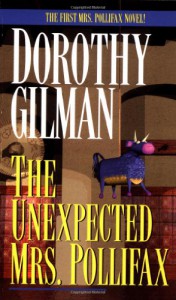 I love the Mrs Pollifax books. They are charming right through. I love that the heroine of these books is an old lady...it's a nice change. It's a little bit Angela Lansbury, I suppose, but charming all the same. I think that Mrs Pollifax has a good bit of spice in her that perhaps Murder She Wrote didn't have.
I love the Mrs Pollifax books. They are charming right through. I love that the heroine of these books is an old lady...it's a nice change. It's a little bit Angela Lansbury, I suppose, but charming all the same. I think that Mrs Pollifax has a good bit of spice in her that perhaps Murder She Wrote didn't have.The books were all written some time ago, so there's still the Iron Curtain in Europe, and Communists are still a threat, but that makes it all the more interesting, to read these as period pieces.
Flush
 This is another great and funny short novel by Hiaasen. I enjoy his adult-oriented novels too, but his earlier YA novel Hoot is, IMO, some of his best work. This one isn't quite as tightly presented as Hoot, but it's highly enjoyable as well. A few situations in Flush were slightly improbable, but the characters and the settings are where Hiaasen shines anyway. (Obviously, the situations in his adult novels are improbable, but it seems less important than in his YA work.)
This is another great and funny short novel by Hiaasen. I enjoy his adult-oriented novels too, but his earlier YA novel Hoot is, IMO, some of his best work. This one isn't quite as tightly presented as Hoot, but it's highly enjoyable as well. A few situations in Flush were slightly improbable, but the characters and the settings are where Hiaasen shines anyway. (Obviously, the situations in his adult novels are improbable, but it seems less important than in his YA work.)Anyway, recommended for the YA fan, or for Hiaasen fans in general.




